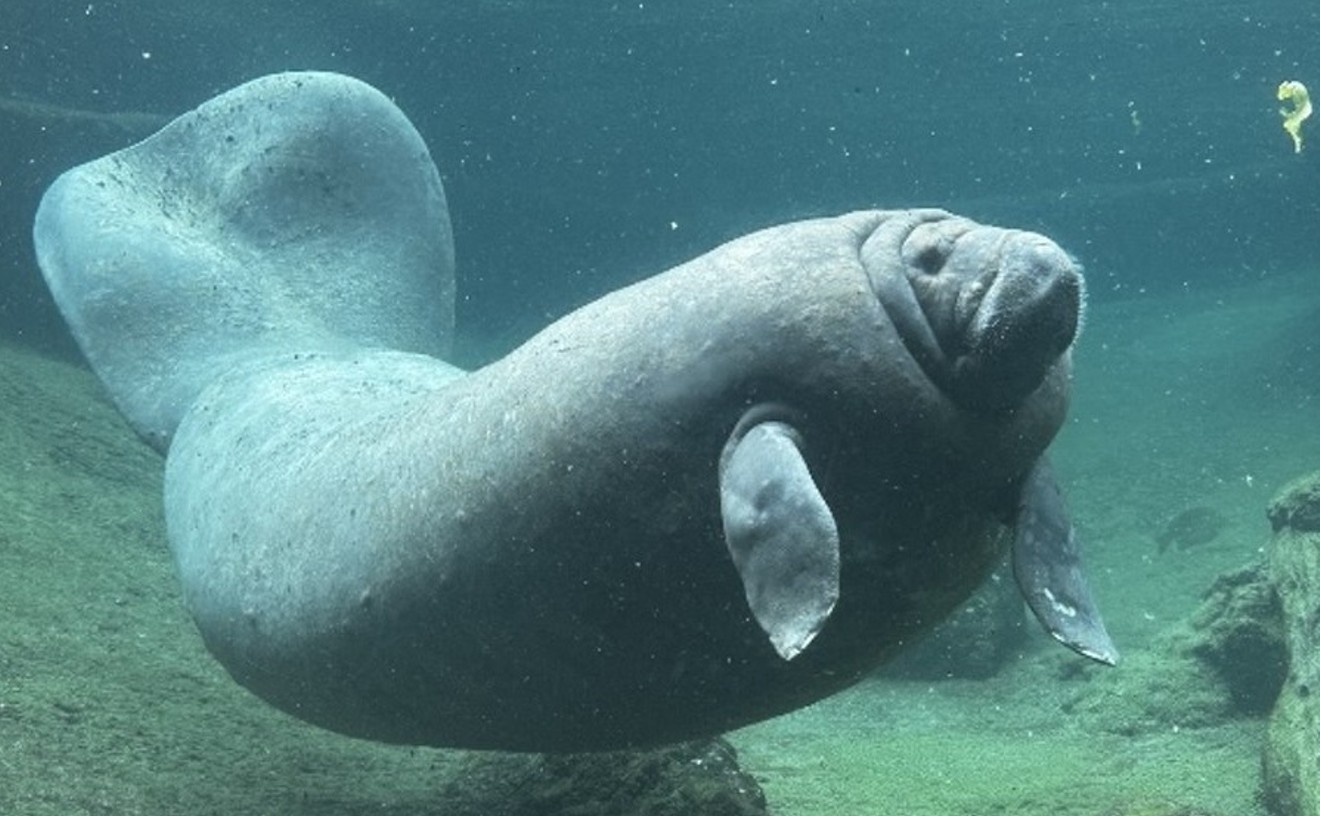Thirty-eight-year-old Jorge's hands show the calluses from long hours spent toiling in the plant nurseries of Homestead, raising the trees, foliage, and potted plants you probably have in your yard. There have been cuts, sweat, and bruises too. All for less than minimum wage. But this is nothing, he says, compared to the trauma he's endured at the hands of the U.S. government.
On December 4, 2010, Jorge, along with his brothers — 40-year-old Mateo and 20-year-old Miguel — were eating dinner at their Homestead house with two friends. They had just taken the pan from the stove after a long day of work.
Then came an urgent knock at the door. A glance through the peephole revealed a police officer and a woman in civilian clothes. The brothers had fled gang violence in Huehuetenango, Guatemala — a small town in the Western Highlands — in 1999. They knew this meant trouble. They were undocumented.
"Maybe they passed the laws to trap criminals, but seeing the reality, it's not like that."
tweet this
"Open up, or it will go very bad for you," the officer demanded.
As Jorge cracked the door, he lost his grip. The officer pushed through, grabbed Jorge's collar, and threw him to the ground, ripping off his shirt in the process.
"I was thinking, What's happening here? Isn't he a police officer?" Jorge says. "He didn't say, 'Hands up,' or anything. He just came in — like a wasp ready to sting you."
Despite years of diligent labor and clean records, the brothers (whose names have been changed for their protection) are just a few of the hundreds of hard-working Central Americans in Homestead whose lives have been put on hold while they await hearings that may send them back to their war-torn countries. They could join the 5,939 undocumented immigrants with no prior convictions who were deported last year.
President Barack Obama's 2014 executive order to grant legal status and work permits to 5 million people who entered the United States illegally as children or who have children who are citizens has been postponed until the Supreme Court determines if the order is constitutional. Invalidating the order could mean even more danger and unrest for millions of undocumented immigrants who established their lives here.
In the interim, July 2015 marked the end of a seven-year federal program that generally prohibited state and local officers from enforcing immigration law. Just before Christmas, President Obama announced his administration would ramp up immigration raids on the homes of undocumented aliens. The move was meant to deter the arrivals of families from Central America after an increase in unaccompanied minor immigrants.
Florida is ground zero for these raids. In 2015, the National Immigration Forum reported that almost a million undocumented immigrants in the state made up just short of 7 percent of the workforce. From October 2008 to February 2015, there were about 21,000 deportations of undocumented immigrants here. By far the biggest chunk was from Miami-Dade County.
That happened even though Miami commissioners agreed in December 2013 to become a "sanctuary city," a place where undocumented refugees can live and work freely. Overall, the city has among the nation's most foreign-born.
Protests have exploded throughout the United States. Clara Cerrato, a 43-year-old Texas native who moved to Honduras in 1992, recently attended one of them at the Krome Service Processing Center, where organizers gathered to protest the forced feeding of ten Bangladeshi men who complained of inhumane conditions while waiting two years for a court date. She stepped aside to answer a rare phone call from her 28-year-old husband, Carlos, who's stuck in the Broward Transitional Center, where about 100 immigration violators are housed while awaiting trial or deportation.
"When I was living in Honduras, we were witnesses to a [gang] murder in 2007," Clara says. "They went after our family, [after Carlos], so he left the country."
For a year, Carlos moved from city to city, hiding from the sicarios. When another attempt was made on his life in 2008, Carlos became desperate. He traveled for two months, reached San Antonio, Texas, and then was caught and placed on a plane right back to Honduras. "When the plane landed, he immediately got on a bus and went back to the U.S. — immediately. He didn't stay one single night in Honduras," Clara says. "[The feds] told him he had a three-year exclusion he had to sign, but for him, it was meaningless. He was here for his life. He won't go back under any circumstances."
His second attempt at crossing the border proved more trying. He was kidnapped in Mexico by a drug cartel, and after his family paid the ransom, they dropped him in Texas. He made his way back to San Antonio, where he lived peacefully for seven years.
But Carlos returned to Honduras in 2014 after one of his brothers was murdered by the gang. He spent a year helping the rest of his family reach safety. In November 2015, when it was his turn to go back to San Antonio, he was captured and taken to the Port Isabel Service Processing Center in Texas. After that, he was transferred to Broward, where he's been waiting for a trial or deportation for months, even though a hearing is required within ten days of detainment. "His deportation officer [says] maybe two more months," Clara says. "I expect things like this to happen in Central America, Mexico, but not here."
Just then, Clara's phone rang again. "Today I just found out there was an attempt on my father-in-law's life as well," she says.
Maria, another immigrant, is enduring a situation that's trying in a very different way. She's been living in America for 15 years. After crossing the border completely alone, spending three days in the desert, and teetering on the edge of starvation, she finally made it to Homestead in 2002. She has made a comfortable life for herself here with her husband and three children.
An Immigration and Customs Enforcement (ICE) officer visited Maria — who declined to give her real name — just two months ago. They didn't read her any rights. They just told her she should expect a court date for deportation. Her eldest son, 11 years old, watched with his two siblings from the kitchen. "My children are traumatized now. They don't know if I'll be home when they come back from school," Maria says. "Humans don't value other humans here. Dogs are regarded more highly here than actual humans."
How is the Florida Legislature, which recently began its annual session, dealing with this immigrant mess? Two weeks ago, six bills were up for vote. One of them, passed by the House Civil Justice Subcommittee by a 9-4 vote, makes it a felony to reenter Florida after having been deported. Another requires law enforcement to cooperate with ICE. The bill — which is sponsored by state Sen. Aaron Bean, a Republican from Fernandina Beach, and state Rep. Larry Metz, a Republican from Yalaha — directly affects Miami's "sanctuary city" status by creating provisions.
"It would really force the Corrections Department and police to share information with ICE and really, in essence, act like immigration agents," says Jonathan Fried, executive director of WeCount, an organization that empowers Latin American immigrants and farmworkers in Homestead. "People will be scared of the police, more so than they are now."
Jorge, Mateo, and Miguel, whose plight is perhaps one of the most dramatic of this new attack on immigrants, say they were at first calmed by the cops when they pushed into the brothers' Homestead house. They announced they were looking for a woman who was being abused by her husband.
Miguel emerged from the kitchen and asked the officers why they were there. Suddenly, the brothers contend, the officer tasered him in the arm, cuffed him, and charged him with resisting arrest with violence and battery on a law enforcement officer, despite his clean record. Though his family paid his bond, the federal government took custody and sent him to Krome, where he stayed until he was deported to Guatemala in 2012. He had been in America only three years.
"We spent all night thinking, worrying, waiting for him to call, and he never called," Mateo says. "Maybe they passed the laws for the security of the community, to trap criminals, but seeing the reality, it's not like that."
A year after Miguel's deportation, they heard another knock on the door. It was 5 o'clock in the morning. This time, Jorge and Mateo didn't answer it. The cops waited. By 7 a.m., Jorge had to leave for work. An officer stopped him, lunchbox in hand.
"The officer asked, 'Do you think you're escaping?' And I said, 'I'm not trying to escape; I'm going to work with my lunch.' And he said, 'Hands up,' and he handcuffed me there. He put his hands in my pockets — taking out my wallet, my ID, my keys — and opened the door to my home," Jorge says. "We don't have security; we don't have liberty."
Mateo, who was inside, was also handcuffed, and the two brothers were taken to Broward Transitional Center for processing. The feds eventually released both men but have initiated deportation proceedings.
"We want the government to put their hands to their hearts to do something that can help us live in peace in this country," Jorge says. "There is so much violence in Guatemala... Where do we go? Who can defend us?"











